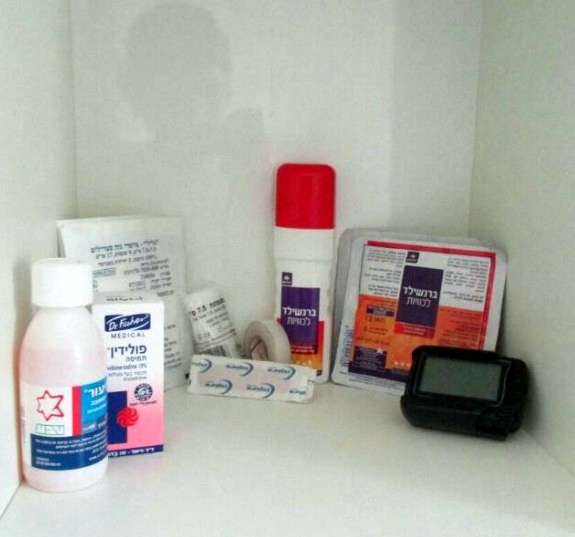Private Initiatives: The Gemach Industry, From Medicines to Tattoo Removal
They dedicate their personal time to meet the needs of others, supplying medicines, documents, household products, holy books, and even tattoo removal services for free—so people don't have to live with negative memories. A wonderful world of gemachs operates across different cities, without any well-oiled systems. Interviews with people who sustain the world—literally speaking.

So many times I found myself hoping that the 24 hours in a day would have a few more added, and then maybe I could really manage to do all the important things I need to do. In reality, it's a bit embarrassing to admit, if I compress the hours wasted on nothing, I might end up with those same hours already allotted. When I interviewed the gemach owners for this article, I prominently felt a sense of missing out. There are people who instead of lamenting the time they don't have, simply live off its remnants, and infuse them with enormous vitality, which even makes me a little envious.
Who are you, the gemach owners, who work day and night for others, dedicating yourselves to the virtue of kindness with such simplicity. A well-known concept for years among the public, called gemach. As its name suggests: act of kindness. It can be kindness in any matter, form, and way, as long as it serves the purpose.
If only you would take a city index of a religious-Haredi settlement, you could discover a wonderful category of gemachs, those that in addition to their private home contents, store an enormous amount of various items, so that if one of you gets stuck, there will be somewhere to turn.
 Medicines Gemach
Medicines Gemach Chazki is a young 20-year-old who has already taken on a project that is far from obvious—to elevate the souls of his father and mother. "Just like there are well-known medicines gemachs, with us it's simply first aid focused on burns," he explains. "Burnshield bandages, which are really crucial in cases of burns and can save lives." Initially, he started something very small, with only a few bandages and additional emergency supplies. He put them in a cabinet and simply sent aid to urgent cases he encountered. Gradually, people learned there was a solution to the issue with Chazki, and his gemach grew. "We set up a hotline that operates 24 hours a day," he shares, and I wonder, what else can a young 20-year-old accomplish. "Many of the people who help this gemach succeed are trained paramedics," explains Chazki. "Sometimes we save them twice. Because not only do they receive the product they needed, but also because a paramedic's eye has seen the place, they can advise them whether to seek further treatment and how urgently." For anyone who wants to join this system and receives approval after checking their seriousness, Chazki provides a kit with all the items that can help in the case of burns and minor injuries.
How do you economically sustain such a gemach?
"There are times when we receive calls from people, and they give us a few coins afterward," Chazki shares, but it doesn't seem to bother him. "I established this purely for the sake of heaven and kindness, I'm not asking for money or for the return of the product taken. Everything is kindness without any charge. A year ago, when he established his gemach, requests might arrive once every two weeks, today they already exceed 300 requests, "and that's without advertising anything, you know... we'd rather keep the money for products than for advertising. Those who need us will know how to reach out," he is sure. In the technological age, how could it be otherwise, this gemach is also half-managed through messages and messaging software. A phone to the hotline is taken, it's posted in a group, and the closest volunteer is located—and the necessary assistance is provided.
"Not everyone can afford to remove a tattoo—facing the pain day after day"
Asa Paz, a young man in the rabbi Shlomo Ofer’s kollel, stands behind an incredible gemach, with its activity being laser tattoo removal, at a price "intended just to maintain the place," he says. When Asa began his journey in the world of repentance, he wanted to get rid of a small tattoo he got during a trip to South America. "I spent very high sums to get rid of this thing. Thankfully, I had the option. I was single, working, so it wasn't truly terrible at all."
When he started studying in the kollel and encountered many in his environment, he discovered the main reason many returnees to faith don't remove the tattoos they made in their previous journey: money. "It’s a painful and expensive process, so they are willing to endure the pain with love and joy, but sometimes, what can you do, they cannot afford it. These are family men, people who work hard in the Torah with little livelihood, everything calculated."
 A world built on kindness (Illustration: shutterstock)
A world built on kindness (Illustration: shutterstock)So he decided to set up a gemach for tattoo removal. With the help of caring people, they established places in Jerusalem and Safed, bought tattoo removal machines, and Asa went to take training so he could work by himself. He didn’t have the money to pay others.
"In the first months, almost no one called because we couldn’t advertise due to lack of budget. But when people began arriving, and word of mouth spread, we realized how much in demand it was. People walked around for years with a tattoo, feeling the sin every day and pained by it. There are people who felt that this image no longer defined them and just wanted to get rid of it. We gave them the opportunity to be purified.
Young people who did not seek to come closer to Judaism, only sought to remove a label that no longer suited them, and these also found themselves coming to Asa's place. There they met the people who engage in this work without compensation, heard stories, and left amazed. "Some returned later to hear more," he says with satisfaction. "So we talked to them, gave them informative materials to take home, and it already turns into more than just a gemach for tattoo removal."
Is there an option like this for women too?
"Certainly," he replies. "Sivan, my wife, knew me knowing this is what I invest my life in during the breaks from Torah study. She was so impressed by the idea that it was clear to her right away she would be the one to do the procedure for women. Even the phone line for inquiries is separate for men and women.
At 75 he endured traveling to remove a tattoo: "After he prayed for me, I was saved"
One of Asa's emotional stories is that which also provides the strength to continue with this kindness. "A 75-year-old man living in Ashdod called us. He did not have a cell phone, certainly not a car. He wanted to remove a tattoo he had been carrying for years. I went to pick him up from the bus station, and he didn't even know that payment was required for the symbolic amount for the treatment—we certainly didn’t ask him for it. I removed the tattoo for him free of charge, and he said he was praying for me to find my mate. I don’t know if he wasn't Elijah the Prophet—because shortly after, I found my rightful match, thank God.
Today they are working on fundraising for the most advanced laser device in the world, which costs half a million shekels. "We must obtain the best to achieve perfect results. Currently, we struggle to completely remove colorful tattoos, for example."
And the success? "There is divine assistance here—period," Asa says in the most believing tone. "People come here after being in so many clinics that couldn’t remove their tattoo, and from here they leave clean. I am just the hand that operates the machine—Hashem sees the will and intention and organizes all the work."
Noa's Gemach: The Girls in the Class Know Where to Find a Siddur
Noa Yaron is 14 years old, studying in the ninth grade. I hear the story of her gemach from her mother, Tzipi: "What happened is that over the years she received many beautiful siddurim as gifts, so she has several, in addition to the siddur she uses. One day, even without telling me in advance, she decided they could help her classmates at school, and simply brought the siddurim there. When a siddur is missing, the girls quickly find out where they can get one, so girls from her grade (5 classes) and even from other grades know she has siddurim. The service is in demand because there’s almost always someone who forgets a siddur—so the girls are very happy. In schools, small gemachs like lending school supplies are common, but a siddur gemach is much less common and therefore welcomed."
 Busy in Giving (Illustration: shutterstock)
Busy in Giving (Illustration: shutterstock)When I ask if she thinks this is an initiative that will continue for a long time, she tells me: "Knowing her, as someone who volunteered for several years at the local charity organization—she will keep this up as long as she’s in school."
My words in the article quickly ran out, and that's even before I got to a family in Kiryat Sefer that has a gemach running from an electrical cabinet ("so you can take what you need when you need it, not just when we're home") and you can find baby items, such as diapers, maternal formula samples, women's hygiene products, including everything. Painkillers, Shabbat candles, and whatnot. And even before the gemach of C from Beitar, which is one of several she holds at her home, and just for example, assists people stuck with governmental documentation issues like National Insurance forms. "Everything comes from personal need," she explained to me. "I knew the challenges I faced in life, and where I needed help, and after I learned myself, I wanted to help those who are in the position I was in."
I don’t know what Rabbi Levi Yitzchak of Berditchev would say about the people featured in this article, and about the thousands more we couldn’t reach. But I have no doubt, as a simple person, that these deeds carry one of the heaviest weights to merit the Jewish people.

